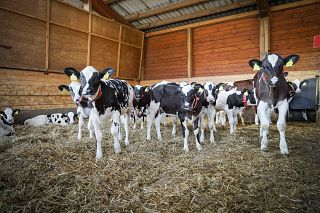What is CCQA?
Welcome to the Calf Care & Quality Assurance (CCQA) program, a first-of-its-kind program for the U.S. calf-raising sector. This vibrant and diverse sector boasts commercial facilities of all sizes. This manual is meant for those raising many different breeds of male and female calves intended for dairy and/or beef production systems. The program promotes a mindset — a way of thinking — that prompts calf raisers to approach management decisions with thoughtfulness and an appreciation for the responsibility they have to their animals, consumers, the environment, and the broader cattle industries in the United States.
Why was CCQA created?
Healthy calves are the cornerstone of every beef, dairy, and veal facility. While the existing cattle quality assurance programs apply to much of the U.S. cattle industry, the industry is evolving and diversifying. The emergence of dairy, beef, contract heifer raising facilities, and calf ranches represent aspects of the cattle production system that currently fall outside of existing programs. As no single organization or program covers all calves, to ensure optimal health and welfare throughout the supply chain, Beef Quality Assurance (BQA), Veal Quality Assurance (VQA), National Dairy Farmers Assuring Responsible Management (FARM), and Dairy Calf and Heifer Association (DCHA) have joined together to collaboratively create a new streamlined program for calf care and management.
Quality assurance programs have become commonplace for all food-producing enterprises as a means to build
consumer confidence that their food is ethically and responsibly produced. Many cattle-specific quality assurance
programs already exist in the U.S. today. BQA, VQA, and FARM are all well-established programs. They establish
practice guidelines and standards that help earn the public’s trust, demonstrating that beef and dairy producers
share their values and are committed not only to quality animal care, but also to ensuring safe, wholesome meat and
milk. While not a formal quality assurance program, the Dairy Calf and Heifer Association Gold Standards also offer
industry benchmarks and best management practices for raising dairy calves and heifers. Together, they have helped
set customer expectations. As science and best practices evolve alongside public attitudes and perceptions, the cattle
industries must continue to show their customers and consumers that they are holding themselves to the highest
standards of animal care.
Calf raisers have many different customers, from cattle buyers and
partners, to meat and dairy processors, as well as consumers. All
of these customers expect that calves will be raised responsibly,
in a manner that ensures optimal health and welfare. At the end
of the supply chain, this expectation translates to ensuring safe,
high-quality meat and dairy products from cattle that are well
cared for. Maintaining customer trust that these products are being
produced responsibly is key to the success and the sustainability
of the industry. Importantly, employing these approaches will
also translate into better outcomes for producers, from improved
resource management to better financial returns. Committing to
calf health management is the right thing to do, for calves,
producers, and consumers.
When was CCQA created?
CCQA started with industry collaboration beginning in 2019, over the last two years a task force of calf raisers, animal scientists, veterinarians, industry groups, and other experts have worked on a framework and foundational resources for the CCQA program. Starting in 2022 the program will roll out resources, training and certification, and self-assessments to serve the calf-raising industry. The work does not stop with the development of resources, it will be constantly reviewed for it's industry relevance and to maintain its foundation as a science-based, common-sense industry standard.
Program Collaborators
The CCQA Program was developed collaboratively with the following programs and organizations:
